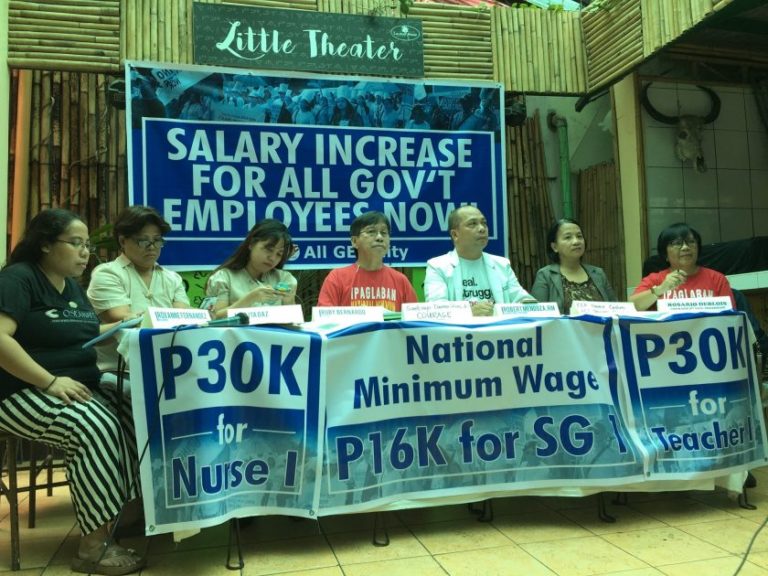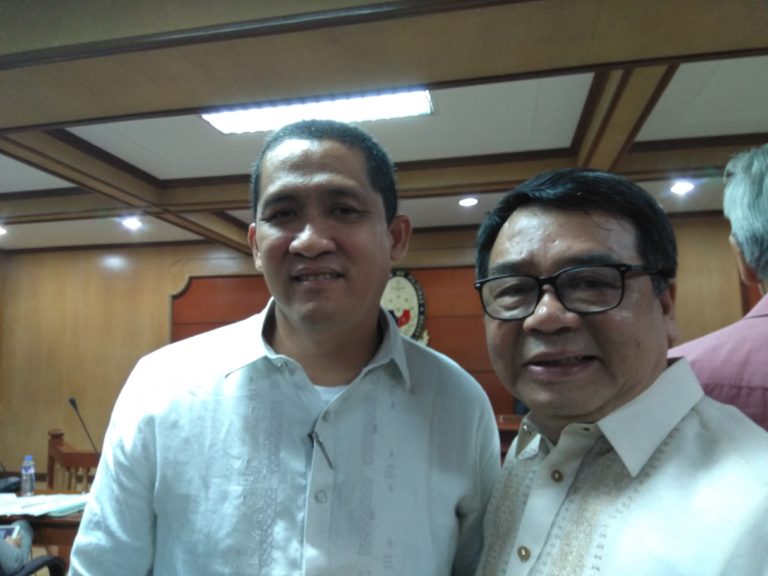“Before it’s too late for our planet and for its peoples’, governments must listen to people and communities for just and equitable development.”
By MARYA SALAMAT
Bulatlat.com
MANILA – From July 9 to 18, world leaders from 47 countries (seven for the second time and that includes the Philippines) gathered for their voluntary national reviews at the United Nation’s HLPF (High-Level Political Forum) in New York, USA.
[[For more details, please click here. ]]
The UN website on sustainable development goals says regular reviews by the HLPF are to be voluntary, state-led, undertaken by both developed and developing countries, and shall provide a platform for partnerships, including through the participation of major groups and other relevant stakeholders.
But in the Philippines and countries in the Asia Pacific (based on the sharing in last March’s Asia-Pacific Peoples’ Forum on Sustainable Development, held in Bangkok, Thailand), peoples organizations complained that they are being pushed out of government’s conferences and marginalized as they seek to insert reports and calls from the ground. In the Philippines, they are being targeted by state forces, their development programs and services maligned, or worse, like the lumad schools, threatened of bombing and forcibly being shuttered.
In fact, there is a growing realization that the SDGs aren’t really about leaving no one behind. “‘Leaving no one behind’ is recognizing, addressing the root causes and systemic barriers that continue to hamper people’s development. The way forward is to harness the power of the people, said Lei Covero of Ibon International, during a UN HPLF-related session, ‘Progress, Gaps and Obstacles.’
(Read also some the ‘shadow reports’ to the Philippine VNR: the summary of Center for Women Resources’ National Monitoring and Review of the Sustainable Development Goals and Development Justice in the Philippines and the joint labor groups’ 2019 Philippine Workers and Trade Union Report on the SDGs https://www.ituc-csi.org/IMG/pdf/philippines_labour_assessment_on_national_sdg_implementation.pdf)
“Under the guise of SDGs, the United Nations continues to perpetuate neoliberal and imperialist policies, facilitating the expansion of corporations and paving the way for unaccountable public-private partnerships that cement corporate power rather than serve the interests of the majority of people,” said a statement forum or Ground Level People’s Forum held last Sunday, July 14, not far from the UN headquarters in New York.
The Philippine government reported to the UN this week that they made sure that the SDGs (sustainable development goals) were integrated in the Philippine Development Plan 2017-2022. It reported efforts in the six goals up for review: the goals for quality education, decent work, reducing inequality, doing climate action, pursuing peace, justice and strong institutions, and ensuring effectiveness of partnerships.
It highlighted government action for alternative learning system, where out-of-school youth and even adults who failed to finish schooling can get certifications. It reported for the goal on decent work the incentives for green jobs and inclusion. In the goal addressing inequality it stressed its dole-out program called Conditional Cash Transfer to disadvantaged families. In climate action it stressed the provision of risk information, ban on single-use plastic in some cities and the unfinished formulation of a framework of action. It reports as “major milestone” the ratification of Bangsamoro Organic Law to address the long-standing conflict in the South.
The report drew criticisms from peoples organizations in the Philippines who show ample documentation of results of government policies that directly conflict with meeting the sustainable goals. As with other representatives of peoples’ movement in New York, they urged the government to implement a system change instead, and pursue “development justice.”
“How will the government address issues on decent work, access to social services, social protection and rights when it rejects UN investigations, withdrew from ICC, openly attacked #rightsdefenders, and denounced the UNHRC resolution?” asked the CSO representatives after the Philippine government reported at the UN.
Statement by CSO reps @ #Philippines VNR: “How will gov’t address issues on decent work, access to social services, social protection & rights when it rejects UN investigations, withdrew from ICC, openly attacked #rightsdefenders, and denounced the UNHRC resolution?” #HLPF2019 pic.twitter.com/yM6cn1tpu5
— IBON International (@IbonInternatl) July 16, 2019
Among the government acts they criticized as contrary to sustainable goals are the reduced budget for education amid increased privatization and commercialization, the increasingly harsh treatment of workers’ strikes and union organizing, of organized agricultural land occupation by farmers and of organized occupation of abandoned mass housing by the urban poor. They cited the more long-lasting impact of land reform and industrialization, peace based on justice rather than dole-outs to a select few and war for the rest of the people. They cited the bloodbath of Duterte’s wars against the people and its critics in the urban and rural areas.
On climate action, there were criticisms of the Duterte government’s programs that infringe on the environment, livelihood and peoples’ communities, from this government’s support of coal plants and huge dams, expansion of plantations, mining and quarrying, and massive reclamation projects. As to “partnerships,” they denounced the Duterte government’s “puppetry” not only to its former colonial ruler, the US, but also increasingly to Chinese government.
When ‘inclusive’ becomes its opposite, CSOs provide counter-space for SDGs
In New York, the Asia-Pacific Forum on Women, Law and Development (APWLD) helped to gather progressive civil societies and peoples’ movements to share their stories of struggles and resistances. At the Ground Level Peoples’ Forum, a “counter-space” to the UN High Level Political Forum, the reports blame the current development model being pursued by governments for attacking the working class and human rights defenders. They aired calls for #DevelopmentJustice in meeting the United Nations’ sustainable goals.
“The governments have gathered to discuss sustainable development without any space for civil society and grassroots communities to voice their concerns and the realities on the ground,” said Neha Gupta of the APWLD.
The members of peoples’ organizations from various countries also marched to the DDrive ag Hammarskjold Plaza in New York on July 14, Sunday. They chanted, “From NY to the Global South – Rise Up, Fist Up, for System Change!” Activists and human rights defenders from around the world shared the stories of communities and their fight to defend their rights in speeches during the protests. They also dramatized their protests against the development model being pursued ostensibly to meet the SDGs, through political cultural performances.
The 47 governments’ voluntary reporting in New York followed the regional forum, another UN process for monitoring developments in achieving the sustainable goals held last March in Bangkok, Thailand. In the Asia-Pacific Forum on Sustainable Development (APFSD), the Philippines sent delegates from the National Economic Development Authority. As with the counters-space in New York, an even bigger number of CSOs met in Bangkok last March to assert their inputs in meeting the 2030 sustainability goals.
They tried to hold a silent picket inside the United Nation’s Building in Bangkok. They tried to show placards with their calls as the heads of governments were scheduled to enter for the final session, but the picket was stopped by the security.
Leaving no one behind
Groups gathered for the Ground Level Political Forum (GLPF) in New York said a vision of people-centered development solution that works for those at the margins of society is crucial, because billions of people and communities are impacted by the current development model where wealth inequality is rising, climate and environmental crises is escalating and grabbing of land and resources is rampant.
“The current economic growth is contrary to the sustainable management of our resources,” said Virginia Dammay, from the group Innabuyong in the Philippines. She decried how the current development plan of the government is sabotaging the indigenous peoples’ long-held practice of sustainable management of resources.
She said the development model pursued by most governments has exacerbated land and resource grabbing and prowled on the exploitation of peoples and women. As a lumad educator once told the government representatives on the subject of shrinking spaces, during a consultation early this year for the VNR, “For us, the indigenous peoples, our land is shrinking, and so is our number.”
“We desperately need a new development paradigm, one that is built upon development justice and the voices, decision-making and agency of the most grassroots and marginalized communities as well as indigenous peoples,” Dammay added.
Mabel Bianco from Fundación para Estudio e Investigación de la Mujer (FEIM) of Argentina, decried the macho-fascist regimes that have risen from everywhere, “from Latin America, to Asia and the Pacific, to Africa and here in the US.”
“These macho-fascist regimes are always in cahoots with corporations, pushing for neoliberal agendas and creating an environment of endless political repression that is threatening and killing human rights defenders and activists everywhere,” she warned.
To fight these regimes and the current unjust system ruling the world, activists and rights defenders who held a rally in New York during the UN’s High Level Political Forum called for building stronger relationship between movements across the globe.
“Many governments ‘attempt’ to solve the issues of poverty and oppression with band-aid solutions that do not address the structures and systems at the actual root of the problem. Often, these systems are not addressed because they are the very structure the government itself is standing upon. The only way to solve these issues is for the power to be in the hands of the people and communities affected,” said Raphael Agosto-Miranda of New York Boricua Resistance, New York.
Seeing how governments intensify their attack “whenever and wherever marginalized communities begin to take back their power,” Agosto-Miranda reiterated the gathered organizations’ solution: to connect, learn from, and stand with one another against our common enemy, imperialism.
“The voices of the peoples’ must be heard and that’s only possible through international solidarity,” added Raphael Agosto-Miranda.
The peoples’ movements reiterated that the demand for a new, fairer approach to development has become stronger and cannot be ignored by governments anymore. “Before it’s too late for our planet and for its peoples’, governments must listen to people and communities for just and equitable development.”
The post Gov’ts, people’s movements hold parallel conferences, offer different analysis, solutions for sustainable development appeared first on Bulatlat.



